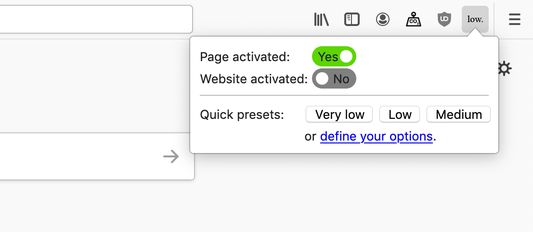Reduce energy consumption and carbon footprint with low-web
Add-on stats
- storage
- tabs
- webNavigation
- webRequest
- webRequestBlocking
- <all_urls>
Ranking
Add-on summary
The extension aims to reduce our datas and limit the energy consumption of our Internet browsing.
The Internet consumes about 8% of the electricity produced worldwide and emits 3 to 4% of total greenhouse gas emissions. Every request, every resource, every calculation, is small amounts of electricity consumed ... and we visit billions of pages, make billions of computer operations, load billions of terabytes... needing to run millions of servers, millions of antennas, millions of miles of fiber and especially devices like telephones always more powerful and ever more obsolete.
For example, when possible, video quality is set to low quality, autoplay and loop parameters are disabled. If it's possible, quality of images is decreased or loading delayed and animated gif only plays when hovering them. Some "superfluous" content can also be blocked like share and like button, avatar images or fonts. An header 'save-data:on' is set to declare to websites that you want to reduce your data.
But do not forget, the reduction of Internet browsing must be done, but it will never have as much impact as the reduction of Internet manufacturing (and devices that connect to it). So keep your computers, phones as long as possible, repair them or do not buy them!
User reviews
Add-on safety
Risk impact

low—web requires some sensitive permissions that could impact your browser and data security. Exercise caution before installing.
Risk likelihood

low—web has earned a fairly good reputation and likely can be trusted.

